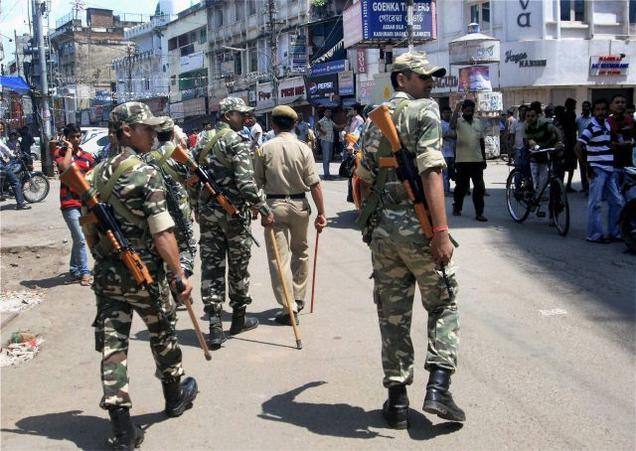
Assam IGP (BTAD) S N Singh told PTI “Flag marches by the Army are on at various places. The situation in the Bodoland Territorial Area Districts (BTAD) is tense but under control.”
The death toll in the violence, which began on July 19-20 has reached 88, he said.
As the 12-hour bandh called by the AAMSU turned violent police opened fire on the supporters who blocked NH 31 at Joghighopa in Bongaigaon district, neighbouring lower Assam’s Bodoland Territorial Autonomous Districts, injuring three of them.
CRPF and police opened fire also in Dhubri district in lower Assam to disperse bandh supporters, who burnt an effigy of Bodoland Territorial Council chief Hagrama Mohilary near Kali Mandir on NH 31 at Gauripur.
The bandh supporters attacked the vehicle of Sonitpur Deputy Commissioner Tapan Chandra Sarmah and three police vehicles escorting him near Idgah Maidan in Tezpur in central Assam.
A youth was critically injured by bandh supporters when he tried to stop them from forcibly closing down shops near Mahabhairab Temple in the heart of the town leading to the imposition of indefinite curfew there.
Indefinite curfew was also imposed in 26 villages of Ambagan in Nagaon district after a clash between bandh supporters and local people who opposed the shutdown.
Mediapersons were attacked in Barpeta in lower Assam and Sibsagar in upper Assam, while sporadic violence was reported along with Morigaon and Nagaon districts of central Assam.
Chief Minister Tarun Gogoi has meanwhile urged political parties and outfits to refrain from calling bandhs which were ‘inflaming passions’ in violence-hit areas.
“I am not happy about the way in which BJP and All India United Democratic Front and some other outfits are conducting themselves. I appeal to them not to make any more provocative statements,” he told reporters here.
Referring to Monday’s bandh in the state by Bajrang Dal and the one on Tuesday by AAMSU, Mr. Gogoi said “This is not a time to call bandhs. Instead of bringing calm, bandhs only flare the temper and also affect the economy. I urge all parties and outfits to refrain from calling bandhs.”
Admitting that the state continued to be rocked by incidents of violence, Gogoi said the army has been given power to seize arms and was confident that results would soon be visible.
The state government has directed several ministers and parliamentary secretaries to visit the violence-hit areas of lower Assam to restore confidence among victims and oversee the return to normalcy.
Among others, Revenue Minister Prithibi Majhi, Planning Minister Tanka Bahadur Rai and Social Welfare Minister Akan Bora, Agriculture Minister Nilomoni Sen Deka, Transport Minister Chandan Brahma and Environment and Forest Minister Rockybul Hussain have left for BTAD and adjacent districts.





Comments
Add new comment